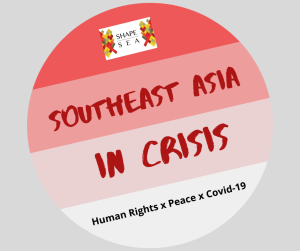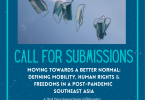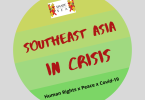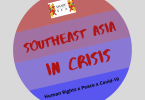Ratu Ayu Asih Kusuma Putri and Pamungkas A. DewantoRatu is Lecturer at the Department of International Relations, Bina Nusantara University, Indonesia. Pamungkas is Researcher at Department of Social and Cultural Anthropology, Vrije Universiteit in the Netherlands
 While the rich industrial countries are simply readjusting their national budgets amid the COVID-19 outbreak, the fiscal options for the middle-to-low income countries seem to be strictly limited. The Indonesian government, for instance, has undergone about USD 51 billion deficit after allocating about USD 25 billion for the health sector and other incentives for the COVID-19 relief (Kementerian Keuangan Republik Indonesia, 2020).Unfortunately, in coping with this unprecedented crisis, the government not only experiences financial deficit but also ˜implementation deficit ™ in channelling the pandemic relief. Jokowi administration relies heavily on the centralized database and numeric data from the ministries which are often lacking in its credibility. Conversely, limited efforts have been made to systematically engage civil society and to acquire a much-needed sense of actual vulnerability within the population. As a result, the top-down strategy amid the COVID-19 outbreak in the country inherently lacks a ˜humanistic ™ touch.The vulnerable population who does not fall into the ˜official ™ numeric category is desperately seeking the attention of the government to no avail. Many households in need were allegedly omitted from receiving the ˜grocery package ™ or paket sembako (Nurbaiti, 2020), indicating the low credibility of the government ™s database on vulnerable citizens. In Malaysia, some Indonesian workers are starving and, some of them, even eating grass to survive in an isolated warehouse because there are not enough savings to buy foods (Kurniawan, 2020). Not to mention the controversies surrounding the USD 16 million online training package for those who were laid-off by their employers due to COVID-19 fallout (Kompas, 2020).Unlike in South Korea or Taiwan where the developmental state model worked effectively, the Indonesian ™s slow response showed otherwise. Fortunately, society plays a pivotal role in fixing the shortcomings of top-down pandemic response strategies. This ˜parallel circuit ™, that is the networks of society that self-mobilizes their resources, offers a more humanistic approach in battling the pandemic. Most importantly, these grass-root acts can be seen as a criticism of the central government ™s incompetence and its slow pandemic response policy.Civil society and private sectors had come up with initiatives of their own and jumped on the bandwagon of pandemic battle. An overwhelming amount of public funds has been raised for COVID-19 relief. Kitabisa, an Indonesian-based online crowdfunding platform, has raised more than Rp.70 billion ($4.5 million) in funds through various campaigns led by celebrities, social media influencers, NGOs, and individual philanthropists. While some notable multinational or local major companies, and business tycoons also pledged to participate in this nation-wide charity movement, amounted to hundreds of billions in funds (IDN Times, 2020; The Jakarta Post, 2020; Chung, 2020).Such solidarity is omnipresent not only domestically but also among Indonesian communities abroad. In a consultative meeting between the Indonesian government and Indonesian Migrant Workers ™ Network (Jaringan Buruh Migran) a few days ago, the government begged for the cooperation from Indonesian migrant communities across the working destination countries to reach out to the most suffering ones during the crisis. Indonesian migrant associations in Malaysia, for instance, have helped the government and many charity organizations distribute grocery packages to their fellow workers. A group of Javanese and Madurese migrant workers even donated a ton of sweet potatoes for those severely affected by Covid-19 (Antara News, 2020). Therefore, the current pandemic has even charted a new scheme of charity, in which workers in need are independently and mutually helping one another.While elements of society have shown their compassion and even built a repertoire of charity movement, its pivotal role is overshadowed by some frivolous political matters. The government has been entangled in a series of petty political squabbles with the critics which are often escalated into repressive acts and legal persecution (CNN Indonesia, 2020). The political fallout of this circumstance has greatly cost the country a prospect for national consolidation amid this looming catastrophe.In a nutshell, pandemic management in Indonesia is still inherently non-inclusive and leaning towards ˜securitization ™. With this ˜securitizing attitude ™, it fails to invigorate the high level of social capital among the society and the enormous resources accumulated from their activities. What the country needs is a consultative relationship between the government and key non-state actors including, inter alia, public health experts, economists, and NGOs working on social issues as important collaborators. Hence, a more ˜humanizing ™ approach should be opted for in times like this.References:Antara News. (2020, April 8). Satu ton ubi jalar disumbangkan TKI Malaysia pada rekan terdampak. Retrieved from Antara News: https://www.antaranews.com/berita/1410254/satu-ton-ubi-jalar-disumbangkan-tki-malaysia-pada-rekan-terdampakChung, G. (2020, April 13). Forbes Asia Tracker: How the Region’s Tycoons, Entrepreneurs, and Businesses are Combating the Coronavirus. Retrieved from Forbes: https://www.forbes.com/sites/gracechung/2020/04/13/forbes-asia-tracker-how-the-regions-tycoons-entrepreneurs-and-businesses-are-combating-the-coronavirus/#a64e1172b642CNN Indonesia. (2020, April 23). Kronologi Ravio Patra Ditangkap versi Koalisi. Retrieved from CNN Indonesia: https://www.cnnindonesia.com/nasional/20200423150432-12-496590/kronologi-ravio-patra-ditangkap-versi-koalisiIDN Times. (2020, April 10). TikTok Donasi Rp. 100 Miliar untuk Penanganan COVID-19 di Indonesia. Retrieved from IDN Times: https://www.idntimes.com/tech/trend/adhyasta-dirgantara/tiktok-donasi-100-miliar-rupiah-untuk-penanganan-wabah-virus-corona-indonesia/2Kementerian Keuangan Republik Indonesia. (2020, April 17). Strategi Pembiayaan COVID-19 Tahun 2020. Retrieved from Kementerian Keuangan Republik Indonesia: https://www.kemenkeu.go.id/publikasi/berita/strategi-pembiayaan-covid-19-tahun-2020/?fbclid=IwAR0KNqjwkPcUPzOEgfSZuvORuHBRdwx1GWmlNDar7VnTbGNJh3EnLqE2NOEKompas. (2020, April 17). Kebijakan Kartu Prakerja Dinilai Tak Efektif, Ekonom: Lebih Terasa Diberikan Bantuan Langsung Artikel ini telah tayang di Kompas.com dengan judul “Kebijakan Kartu Prakerja Dinilai Tak Efektif, Ekonom: Lebih Terasa Diberikan Bantuan Langsung “, https://ww. Retrieved from Kompas: https://www.kompas.com/tren/read/2020/04/17/213716365/kebijakan-kartu-prakerja-dinilai-tak-efektif-ekonom-lebih-terasa-diberikan?page=allNurbaiti, A. (2020, April 21). Hunger hits as many Indonesians struggle during COVID-19 pandemic. Retrieved from The Jakarta Post: https://www.thejakartapost.com/news/2020/04/21/hunger-hits-as-many-indonesians-struggle-during-covid-19-pandemic.htmlThe Jakarta Post. (2020, March 23). We’re all in this together: Companies join hands to mitigate COVID-19 pandemic. Retrieved from The Jakarta Post: https://www.thejakartapost.com/news/2020/03/23/were-all-in-this-together-companies-join-hands-to-mitigate-covid-19-pandemic.html
While the rich industrial countries are simply readjusting their national budgets amid the COVID-19 outbreak, the fiscal options for the middle-to-low income countries seem to be strictly limited. The Indonesian government, for instance, has undergone about USD 51 billion deficit after allocating about USD 25 billion for the health sector and other incentives for the COVID-19 relief (Kementerian Keuangan Republik Indonesia, 2020).Unfortunately, in coping with this unprecedented crisis, the government not only experiences financial deficit but also ˜implementation deficit ™ in channelling the pandemic relief. Jokowi administration relies heavily on the centralized database and numeric data from the ministries which are often lacking in its credibility. Conversely, limited efforts have been made to systematically engage civil society and to acquire a much-needed sense of actual vulnerability within the population. As a result, the top-down strategy amid the COVID-19 outbreak in the country inherently lacks a ˜humanistic ™ touch.The vulnerable population who does not fall into the ˜official ™ numeric category is desperately seeking the attention of the government to no avail. Many households in need were allegedly omitted from receiving the ˜grocery package ™ or paket sembako (Nurbaiti, 2020), indicating the low credibility of the government ™s database on vulnerable citizens. In Malaysia, some Indonesian workers are starving and, some of them, even eating grass to survive in an isolated warehouse because there are not enough savings to buy foods (Kurniawan, 2020). Not to mention the controversies surrounding the USD 16 million online training package for those who were laid-off by their employers due to COVID-19 fallout (Kompas, 2020).Unlike in South Korea or Taiwan where the developmental state model worked effectively, the Indonesian ™s slow response showed otherwise. Fortunately, society plays a pivotal role in fixing the shortcomings of top-down pandemic response strategies. This ˜parallel circuit ™, that is the networks of society that self-mobilizes their resources, offers a more humanistic approach in battling the pandemic. Most importantly, these grass-root acts can be seen as a criticism of the central government ™s incompetence and its slow pandemic response policy.Civil society and private sectors had come up with initiatives of their own and jumped on the bandwagon of pandemic battle. An overwhelming amount of public funds has been raised for COVID-19 relief. Kitabisa, an Indonesian-based online crowdfunding platform, has raised more than Rp.70 billion ($4.5 million) in funds through various campaigns led by celebrities, social media influencers, NGOs, and individual philanthropists. While some notable multinational or local major companies, and business tycoons also pledged to participate in this nation-wide charity movement, amounted to hundreds of billions in funds (IDN Times, 2020; The Jakarta Post, 2020; Chung, 2020).Such solidarity is omnipresent not only domestically but also among Indonesian communities abroad. In a consultative meeting between the Indonesian government and Indonesian Migrant Workers ™ Network (Jaringan Buruh Migran) a few days ago, the government begged for the cooperation from Indonesian migrant communities across the working destination countries to reach out to the most suffering ones during the crisis. Indonesian migrant associations in Malaysia, for instance, have helped the government and many charity organizations distribute grocery packages to their fellow workers. A group of Javanese and Madurese migrant workers even donated a ton of sweet potatoes for those severely affected by Covid-19 (Antara News, 2020). Therefore, the current pandemic has even charted a new scheme of charity, in which workers in need are independently and mutually helping one another.While elements of society have shown their compassion and even built a repertoire of charity movement, its pivotal role is overshadowed by some frivolous political matters. The government has been entangled in a series of petty political squabbles with the critics which are often escalated into repressive acts and legal persecution (CNN Indonesia, 2020). The political fallout of this circumstance has greatly cost the country a prospect for national consolidation amid this looming catastrophe.In a nutshell, pandemic management in Indonesia is still inherently non-inclusive and leaning towards ˜securitization ™. With this ˜securitizing attitude ™, it fails to invigorate the high level of social capital among the society and the enormous resources accumulated from their activities. What the country needs is a consultative relationship between the government and key non-state actors including, inter alia, public health experts, economists, and NGOs working on social issues as important collaborators. Hence, a more ˜humanizing ™ approach should be opted for in times like this.References:Antara News. (2020, April 8). Satu ton ubi jalar disumbangkan TKI Malaysia pada rekan terdampak. Retrieved from Antara News: https://www.antaranews.com/berita/1410254/satu-ton-ubi-jalar-disumbangkan-tki-malaysia-pada-rekan-terdampakChung, G. (2020, April 13). Forbes Asia Tracker: How the Region’s Tycoons, Entrepreneurs, and Businesses are Combating the Coronavirus. Retrieved from Forbes: https://www.forbes.com/sites/gracechung/2020/04/13/forbes-asia-tracker-how-the-regions-tycoons-entrepreneurs-and-businesses-are-combating-the-coronavirus/#a64e1172b642CNN Indonesia. (2020, April 23). Kronologi Ravio Patra Ditangkap versi Koalisi. Retrieved from CNN Indonesia: https://www.cnnindonesia.com/nasional/20200423150432-12-496590/kronologi-ravio-patra-ditangkap-versi-koalisiIDN Times. (2020, April 10). TikTok Donasi Rp. 100 Miliar untuk Penanganan COVID-19 di Indonesia. Retrieved from IDN Times: https://www.idntimes.com/tech/trend/adhyasta-dirgantara/tiktok-donasi-100-miliar-rupiah-untuk-penanganan-wabah-virus-corona-indonesia/2Kementerian Keuangan Republik Indonesia. (2020, April 17). Strategi Pembiayaan COVID-19 Tahun 2020. Retrieved from Kementerian Keuangan Republik Indonesia: https://www.kemenkeu.go.id/publikasi/berita/strategi-pembiayaan-covid-19-tahun-2020/?fbclid=IwAR0KNqjwkPcUPzOEgfSZuvORuHBRdwx1GWmlNDar7VnTbGNJh3EnLqE2NOEKompas. (2020, April 17). Kebijakan Kartu Prakerja Dinilai Tak Efektif, Ekonom: Lebih Terasa Diberikan Bantuan Langsung Artikel ini telah tayang di Kompas.com dengan judul “Kebijakan Kartu Prakerja Dinilai Tak Efektif, Ekonom: Lebih Terasa Diberikan Bantuan Langsung “, https://ww. Retrieved from Kompas: https://www.kompas.com/tren/read/2020/04/17/213716365/kebijakan-kartu-prakerja-dinilai-tak-efektif-ekonom-lebih-terasa-diberikan?page=allNurbaiti, A. (2020, April 21). Hunger hits as many Indonesians struggle during COVID-19 pandemic. Retrieved from The Jakarta Post: https://www.thejakartapost.com/news/2020/04/21/hunger-hits-as-many-indonesians-struggle-during-covid-19-pandemic.htmlThe Jakarta Post. (2020, March 23). We’re all in this together: Companies join hands to mitigate COVID-19 pandemic. Retrieved from The Jakarta Post: https://www.thejakartapost.com/news/2020/03/23/were-all-in-this-together-companies-join-hands-to-mitigate-covid-19-pandemic.html





